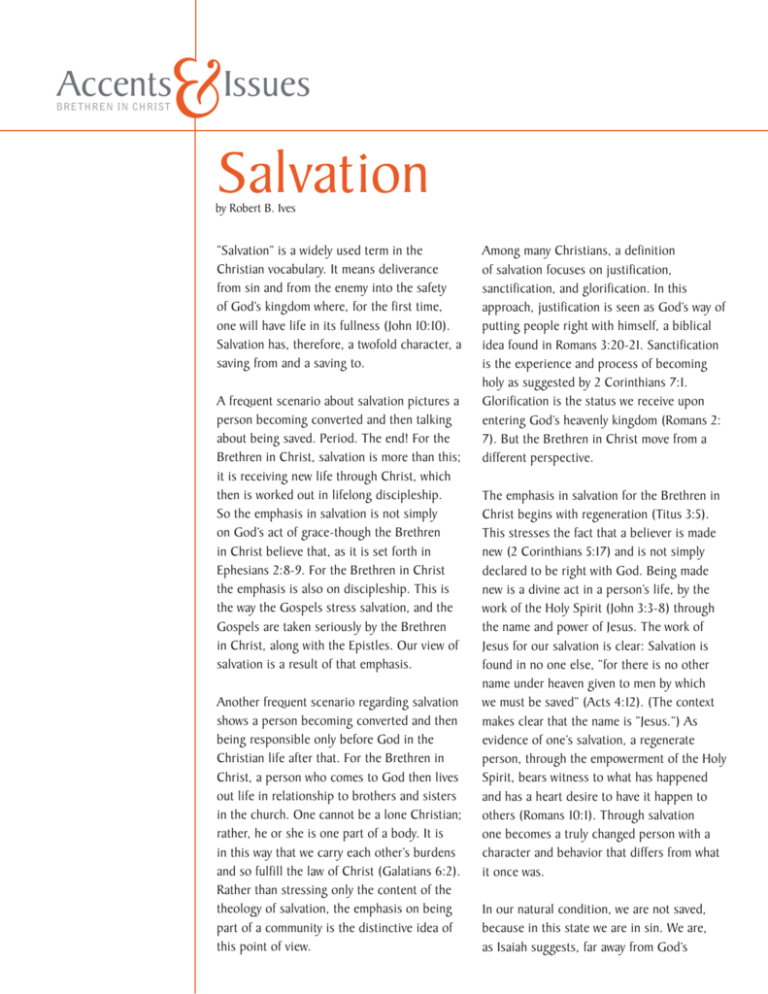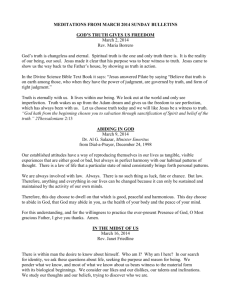Salvation - Brethren in Christ Church
advertisement

��������������������� ������������������ ��������� by Robert B. Ives “Salvation” is a widely used term in the Christian vocabulary. It means deliverance from sin and from the enemy into the safety of God’s kingdom where, for the first time, one will have life in its fullness (John 10:10). Salvation has, therefore, a twofold character, a saving from and a saving to. A frequent scenario about salvation pictures a person becoming converted and then talking about being saved. Period. The end! For the Brethren in Christ, salvation is more than this; it is receiving new life through Christ, which then is worked out in lifelong discipleship. So the emphasis in salvation is not simply on God’s act of grace-though the Brethren in Christ believe that, as it is set forth in Ephesians 2:8-9. For the Brethren in Christ the emphasis is also on discipleship. This is the way the Gospels stress salvation, and the Gospels are taken seriously by the Brethren in Christ, along with the Epistles. Our view of salvation is a result of that emphasis. Another frequent scenario regarding salvation shows a person becoming converted and then being responsible only before God in the Christian life after that. For the Brethren in Christ, a person who comes to God then lives out life in relationship to brothers and sisters in the church. One cannot be a lone Christian; rather, he or she is one part of a body. It is in this way that we carry each other’s burdens and so fulfill the law of Christ (Galatians 6:2). Rather than stressing only the content of the theology of salvation, the emphasis on being part of a community is the distinctive idea of this point of view. Among many Christians, a definition of salvation focuses on justification, sanctification, and glorification. In this approach, justification is seen as God’s way of putting people right with himself, a biblical idea found in Romans 3:20-21. Sanctification is the experience and process of becoming holy as suggested by 2 Corinthians 7:1. Glorification is the status we receive upon entering God’s heavenly kingdom (Romans 2: 7). But the Brethren in Christ move from a different perspective. The emphasis in salvation for the Brethren in Christ begins with regeneration (Titus 3:5). This stresses the fact that a believer is made new (2 Corinthians 5:17) and is not simply declared to be right with God. Being made new is a divine act in a person’s life, by the work of the Holy Spirit (John 3:3-8) through the name and power of Jesus. The work of Jesus for our salvation is clear: Salvation is found in no one else, “for there is no other name under heaven given to men by which we must be saved” (Acts 4:12). (The context makes clear that the name is “Jesus.”) As evidence of one’s salvation, a regenerate person, through the empowerment of the Holy Spirit, bears witness to what has happened and has a heart desire to have it happen to others (Romans 10:1). Through salvation one becomes a truly changed person with a character and behavior that differs from what it once was. In our natural condition, we are not saved, because in this state we are in sin. We are, as Isaiah suggests, far away from God’s ������������������������� saving presence (Isaiah 59). But then by a free gift - that is, by grace we are put right with God through faith in Jesus Christ. And that is salvation. This does not come about by hoping that our sin will go away, but God actually does something to ensure that it will. Through the power of the blood and resurrection of Jesus Christ, God cleanses the sinner from sin. Normally, the subjective evidence of our salvation is a “heartwarming experience.” However, the more important evidence of our new life in Christ is our commitment to him as Lord. Whoever believes in Jesus is promised eternal life. Eternal life defines a quality of life which continues forever; this is the life of God, which also is the life of God’s people. On our own, we are quite incapable of experiencing that kind of life, but faith in Jesus makes it possible. That is because, by His Spirit, Jesus works a true change in the quality of our lives, a change which begins now and not in the heavenly future. Regeneration then leads to discipleship. Jesus’ instruction to his disciples becomes ours: “If anyone would come after me, he must deny himself and take up his cross and follow me” (Matthew 16:24). This commitment to discipleship means the constant activity of living in Jesus’ way in all of one’s life. . Since salvation means deliverance from all that would ruin one in this life and in the world to come, it clearly involves more than only an initial act. Salvation is a lifelong experience and process. There are evil forces at work all the time to cripple us spiritually. For this reason Jesus taught us to pray two fundamental requests in the Lord’s prayer: “Forgive us our debts, as we also have forgiven our debtors,” and “Lead us not into temptation, but deliver us from the evil one” (Matthew 6:12-13). We pray in the confidence that God can and will deliver us, but his deliverance is associated with the discipleship of the cross and our daily lives as we strive to serve others and not merely to satisfy ourselves. Those denominations, like the Brethren in Christ, who stress obedience in discipleship face the possible danger of legalism. One may ask the question, “Could salvation have occurred if, for example, one did not give up pride?” But then how shall we measure whether one has pride? Our commitment to a visible church means that this measurement must be in concrete terms. Hence the possibility of legalism. While danger exists in measuring spiritual life by external practices, such as attendance at church, smoking, gambling, alcohol consumption, etc., there is also danger in the view that these external matters mean nothing. Discipleship is a broad, life-involving measure of salvation. It entails total commitment and a lifelong following of Jesus under the cross. So, Jesus says in Matthew 10:22, “He who stands firm to the end will be saved.” We have help of the highest order in this continuation of salvation: Jesus “is able to save completely those who come to God through him, because he always lives to intercede for them” (Hebrews 7:25). As the New Testament speaks of salvation, it encompasses deliverance from darkness, sin, and death; it also includes deliverance to a life of Sonship and obedience. And so, for the Brethren in Christ, “salvation” is a comprehensive term which incorporates individual experience and, as well, the relationships, life situations, and service that flow from the new life in God.









